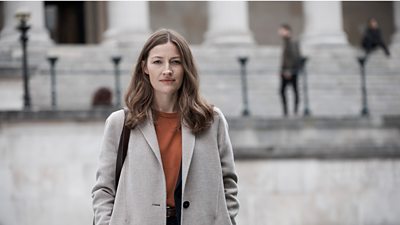Interview with Kelly Macdonald
Interview with Kelly Macdonald, who plays Sarah in Giri/Haji.

It’s not a procedural in any shape. It’s a police story, but it’s almost noirish… I can’t liken it to anything else, really, and I think that’s a huge bonus. It’s its own, weird, Joe Barton creature.
How are we introduced to Sarah at the start of Giri/Haji?
When we’re introduced to Sarah, we realise she is persona non grata in her work in her work environment and we don’t know why. But we discover she’s dobbed in one of her own. She’s a police officer, and everybody has taken against her and she’s getting edged out of her work environment and sent off to lecture most of the time, rather than work on actual crime-solving. So she’s not the happiest person. She’s pretty lonely, and then her life gets upended in a really dramatic and quite pleasing way when this Japanese crime story filters into London.
You’ve worked with lead director Julian Farino before. Was that a factor in your decision to do this?
Yes, Julian was the first thing. We did The Child In Time together, and that was such a brilliant working experience and relationship, so when he called and said, “I’ve got a thing, I think you’d be perfect for it, will you read it?” I said yes. I think his taste is impeccable, I trust him so much.
I was filming another 91�ȱ� series called The Victim when he sent me the first couple of episodes. We were filming a lot of courtroom scenes and I hadn’t done my scenes where I was in the dock yet, so I had a lot of brain space. In between setups, I would read what I could and I got completely hooked. I read the scripts really quickly and called him up and said, “I need more. Have you got any more to send me?” [Laughs]
Was there much to dig into research-wise, in terms of police work and forensic science?
No… [Laughs]. I tend to work in quite an instinctual way. I know there are lots of different routes for different actors, but that’s just the way I’ve always been. Generally, unless I’m having to learn an accent or learn how to ride a horse or something, it’s all in the script, everything I need to know. The emotional side of the character is always pretty clear to me, so I don’t feel there’s anything to be found outside of that.
There’s a very memorable, quite surreal moment in the first episode when you have to deal with a snake in your letterbox. What was that like to shoot?
It is surreal, because it’s all on its own and never actually fully explained [laughs]. We actually had to reshoot the snake scene with a different snake, because our snake on the first night was just… just lazy, frankly. It didn’t want to move at all, so it looked like a fake snake. The handler was there and they were fine with it, but I kinda had to poke it a bit through the mesh of the letterbox catcher and it wasn’t bothered. It wasn’t fussed at all [laughs]. It was a super laid-back, super-chilled snake.
Giri/Haji is hardly a straightforward crime-thriller. How would you sum it up?
It’s not a procedural in any shape. It’s a police story, but it’s almost noirish… I can’t liken it to anything else, really, and I think that’s a huge bonus. It’s its own, weird, Joe Barton creature. Joe’s so annoyingly talented. I just think his writing is brilliant.
Was there ever a sense of culture clash on set, working with Takehiro Hira, and Aoi Okuyama?
There was no clash. I think I was a really bad influence on them in the end! We did a good few week filming in Sarah’s flat, and Tak and Aoi had a real problem with walking into the house and not taking their shoes off [laughs]. Both just in life, and in questioning their characters being Japanese and coming in and not taking their shoes off. That’s something that would not occur to me. Obviously. Because I’m British.
How were you a bad influence on them?
Because I spent most of my time with Tak, I think I made him just rude and sarcastic and cheeky. At first he was super-polite, and then he was taking the piss like a true… [Laughs] well like me, basically. So yeah, I think I was a bad influence.
Did you learn anything from the Japanese cast?
I speak no Japanese, but I can actually say one thing now. Which I said constantly. It was one of my lines in the script where I was learning how to say, “it’s all going to shit” - but in a very polite Japanese way. So the Japanese actors would be talking on set, and I would just stroll past and say it, and they would think it was hilarious [laughs]. Because it was the only thing I could say and I just said it all the time.
The Legend Of Giri/Haji
“Let me tell you a story. It
starts with Kenzo Mori. A Tokyo
detective, living a quiet life...
Until his younger brother comes to
him for help. Yuto. The black sheep
of the family. He’d done something
very stupid. But, as it turns out,
not everything can be fixed. Fast
forward a year and Yuto is dead.
Just another Yakuza that met his
end in a hail of bullets. Except
maybe not... Because as Kenzo is
about to find out, the past has a
way of coming back to haunt you.
Rumours start to circle that the
younger Mori brother may be alive
and living in a far-off land. And
soon Kenzo is on a journey to see
for himself. Kenzo and Yuto. A
killer and a saviour. But which is
which? Now, trouble follows Kenzo
everywhere he goes, but so, as it
turns out, does his daughter -
Taki. Sixteen years old. A brave
girl who befriends a lost boy.
Rodney. Half Japanese, half
English. He thinks if he talks loud
enough he won’t be able to hear his
demons. But he doesn’t know yet
just how loud they can scream.
On his way looking for his brother
Kenzo meets Sarah. Another cop
trying to escape something she
can’t outrun. Two people in a city
of eight million and they find each
other. So I suppose this isn’t just
a story about death. It’s a story
about life. And love. And
heartbreak. About the split second
decisions that we make and the
things we lose and win as a result.
It’s a story about gangsters.
(Abbot and Fukuhara)
Killers.
(Donna and Jiro)
Cowards.
(Vickers)
And heroes.
(Rei, Natsuko, Eiko,
Toshio)
It’s about two brothers. Engulfed
in chaos.”
